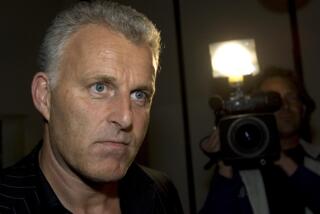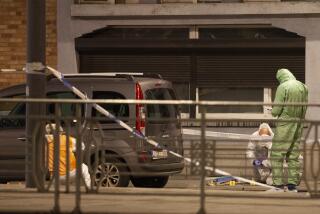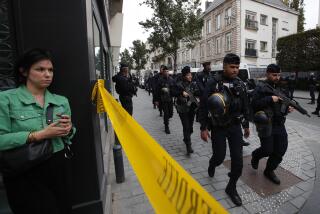Suspect in Slaying of Filmmaker Faces Terrorism Charges
- Share via
AMSTERDAM — A Moroccan Dutch man was arraigned Friday on charges of murder and terrorism in the killing of a director whose film denounced the mistreatment of women in Muslim communities.
Police were also holding six other suspects who could face terrorism charges in Tuesday’s slaying of filmmaker Theo Van Gogh. Authorities said the case increasingly appeared to be the first Islamic terrorist attack in the Netherlands.
Investigators have focused on the international connections of the suspects, several of whom were detained briefly last year for possible ties to a Moroccan militant network suspected in suicide bombings in Casablanca in 2003.
The murder suspect, identified only as Mohammed B., wrote a will stating that his attack on Van Gogh was a suicide mission, and a five-page letter threatening Ayaan Hirsi Ali, a female legislator whose script was the basis for Van Gogh’s film, authorities said.
The six detainees allegedly had plans to kill Ali and possibly other prominent figures, said Leo de Wit, Amsterdam’s chief prosecutor.
“It’s a group of radicals who see us as the enemy, and with whom we’ve actually been drawn into a war,” said politician Jozias Van Aartsen in the Het Parool newspaper. Van Aartsen, who is a member of the People’s Party for Freedom and Democracy, to which Ali belongs, added, “There’s a jihad in the Netherlands. Ayaan Hirsi Ali indicated this danger a year and a half ago, and now we’ve crossed a threshold.”
Many see the killing of Van Gogh as the second attack in Europe by Islamic militants this year. In March, train bombings in Madrid killed 191 people. The Van Gogh killing, however, involved a different strategy: a high-impact slaying of a well-known artist.
“It’s a small version of a terrorist attack,” a law enforcement official said in an interview. “The police are out there working this very hard and looking for people. They are certainly looking at involvement of groups” such as the Moroccan Islamic Combatant Group, a network suspected in the Casablanca and Madrid bombings.
Van Gogh’s killing had a ritualistic, execution-like quality reminiscent of videotaped beheadings in Iraq, analysts said. The killer ambushed the filmmaker as he rode his bicycle, shooting him repeatedly, then slitting his throat as he lay wounded and using a second knife to pin the letter to the body.
That document, “An open letter to Ayaan Hirschi Ali,” threatens politicians, bears anti-Semitic diatribes, calls for global jihad and predicts the downfall of Europe and the United States.
“What’s disturbing is that the suspect, born and raised in the Netherlands, went through a radicalization process here that brought him to this unimaginable deed,” Justice Minister Piet Hein Donner told reporters.
The letter believed written by Mohammed B. gives the impression of speaking for a group, Donner said. Investigators said the language reflected the influence of the militant Takfir wal Hijra movement, which is popular among radicalized Muslim criminals in Europe and North Africa.
Takfiris allegedly dominated the cell that carried out the Madrid train bombings. At least two fugitives in the Madrid attacks made phone calls to associates in the Netherlands and might have fled here.
As The Times reported Wednesday, investigators have confirmed that Mohammed B. was known to the Dutch intelligence service for some time. His associates include Samir Azzouz, 18, who awaits trial on charges of planning a terrorist attack against a nuclear reactor and Amsterdam’s Schiphol Airport.
Like several of the suspected accomplices in the Van Gogh case, Azzouz was first detained in October 2003 in connection with the investigation of the Casablanca suicide bombings.
But they were all released under Dutch laws, which are among Europe’s most protective of defendants. Dutch anti-terrorism investigators have 150 men, identified as hard-core jihadis, under surveillance; though authorities consider the men dangerous, they do not have grounds to arrest them. Mohammed B. was not among that group, but he had been investigated, said the law enforcement official, who asked to remain anonymous.
The Dutch want to know whether the government did enough to protect Van Gogh, who began getting threats after his 11-minute fictional film, “Submission,” aired in August. It tells the story of Muslim women who suffer rape, beatings and other abuse, and its images of a woman with Koranic verses painted on her body angered some Muslims.
The extremist threat in the Netherlands has escalated, and a number of accused jihadis have been arrested since anti-terrorism efforts were stepped up after the Sept. 11 attacks. The presence of 1,200 Dutch troops in the U.S.-led coalition in Iraq is seen as a factor.
Meanwhile, police were on a heightened alert for fear of an anti-Muslim backlash. A small fire damaged a mosque in Utrecht on Thursday night, and police were investigating the possibility of arson.
*
Times staff writer Rotella reported from Paris and special correspondent Heingartner from Amsterdam.
More to Read
Sign up for Essential California
The most important California stories and recommendations in your inbox every morning.
You may occasionally receive promotional content from the Los Angeles Times.













